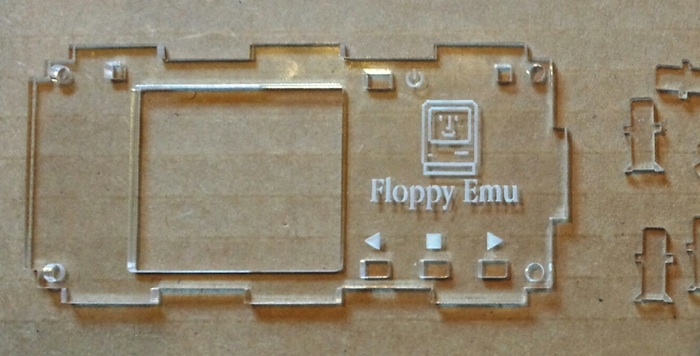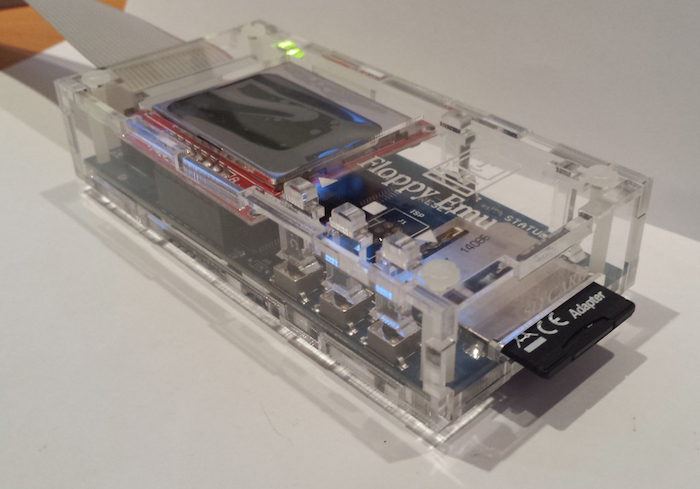Oops! Laser Cut Material Thickness

Manufacturing is hard. The thickness of my supplier’s clear acrylic material has magically increased 15%, meaning that the latest batch of Floppy Emu acrylic cases are impossible to assemble. The buttons and light pipes don’t fit in the cut-outs made for them, so this entire batch of product will have to be thrown out. I’m hoping the supplier will agree to re-run my order or provide a refund, but I’m not optimistic since 15% is just within their stated tolerance. An expensive mistake in manufacturing for me!
For the past year, I’ve been offering laser-cut case enclosures as a Floppy Emu accessory, and I’ve sold hundreds of the cases to happy customers. They’re made from 3.0 mm (nominal) clear acrylic. With all of my past orders from the laser cutter, the parts I received had an actual thickness between 2.73 mm and 2.83 mm, and my design accounts for that. A case assembled from the old ~2.75 mm thick material looks like this:

I just received a new delivery of parts yesterday, and the material thickness changed to 3.15 mm! Imagine if you were building a house with 8 foot ceilings, but some of the framing lumber was over 9 feet – it would never work. That’s the same magnitude of change I’m facing now. The buttons and light pipes are cut from the same material as the case body, so now they’re 3.15 mm thick. But the cut-outs in the top of the case are only about 3.05 mm, and the parts won’t fit through. It’s still possible to assemble the six sides of the case, but without the buttons and light pipes it’s useless.
The supplier’s material thickness is rated at +/- 15%, so this is really my fault and not theirs. But +/- 15% is a huge margin. How am I supposed to make that work? If I make cut-outs big enough to accept 3.45 mm (+15%) thick buttons, but the actual material thickness in a future delivery is 2.55 mm (-15%), it’ll be so loose that buttons will just fall out. There’s no way I can see to accommodate a thickness tolerance that large.
Some of you may be thinking that I should never have made a design that relied on the material thickness as a critical parameter, and you’re right. But again, I’m not sure how I could have avoided it – any design where two parts meet at right angles with a tab-and-slot system will suffer from the same problem. For now, I’m faced with either re-cutting all the buttons and light pipes using thinner material if I can find some, or re-cutting all the case tops using bigger cut-outs.
Read 15 comments and join the conversation15 Comments so far
Leave a reply. For customer support issues, please use the Customer Support link instead of writing comments.


This doesn’t sound right. I just received and assembled a Wong-hung-low $13 variable DC power supply from Bangood, which includes a really nice pexiglass case. And, like yours, the pieces are put together using slots. As cheap as it may be, the pieces of the case fits perfectly! Not even 1mm off. Granted that they make thousands of these, at least theirs came out with zero tolerance. You’ve got to find another manufacturer! If the Chinese can get perfectly cut pexiglass pieces, so can anyone else.
The problem isn’t the exactness of the cuts, it’s the thickness of the material. I’m fairly certain they get the material from yet another supplier, and are just passing along that supplier’s thickness tolerance data. I’m waiting for Monday to hear their reply to my customer support request.
That tolerance sounds about right for cell cast acrylic. That’s just the variability in making the acrylic sheets.
You can use extruded acrylic instead with tighter tolerances, but that has other issues instead.
http://www.sawmillcreek.org/showthread.php?68176-Cast-vs-Extruded-acrylic
you probably already thought of this, but can you just get new buttons/light pipes made using high precision acrylic, and use the generous tolerance acrylic for the fat cases?
Good idea. Unfortunately I haven’t found any high precision acrylic – it’s all +/- 15% tolerance on thickness. I could maybe use a different material for the buttons, but that would change the appearance and increase the cost. The best solution would be to find a way to modify my design so that the thickest buttons still fit, and the thinnest buttons aren’t so loose that it causes problems. I’ll have to think about that one…
The supplier agreed to re-cut all the case tops, and added a note to my profile for an allowable thickness range of 2.8 mm to 3.1 mm. If they don’t have material available in that range, they’ll contact me before doing the cutting. Win!
Woohoo — how nice of them!
I have been saving my pennies for a Floppy Emu, cable, and case. Do you have any “good” cases still in stock, or should I just order the other two items and get the case later? Or do you have an ETA on your next shipment of re-cut case tops, so that I’ll wait until then for the whole order? That’s good customer service on the part of your supplier; it’s easy to do customer service when everything is going smoothly, but the companies that are really worthy of your repeat business are the ones that are good about straightening out mistakes when they happen!
I’d recommend waiting: I expect to have new cases within a week.
I am glad to hear you’ve found a work around here with your issue! Looking at the picture above more closely, I kind of resent having not gotten a case with my somewhat recent purchase. I would be more interested in using some of these spare custom clear acrylic buttons with some cool/tacky skulls within that I found in the back of a shop’s storage room – in place of the original buttons. If you weren’t required to return the “bad” cases I would buy one sans buttons to bore holes in and modify – if you were so inclined to oblige.
New cases are available for sale now. @Cody, I recut the top panels only, and not the entire case, so unfortunately I don’t have any “reject cases” I can offer.
Ah I see, that would be the best way to fix it. Thanks for the consideration!
Would you mind sharing the email that you sent to customer support? I’ve never had much luck with vendors and would love to learn by example.
My approach for situations like these: be specific about what you’d like the company to do to make you happy. If it’s reasonable, you’ll probably get it. I think this works better than a generic “you suck!” letter and leaving them to guess what will resolve this issue, if anything. Here’s what I wrote:
Hi, did Ponoko recently change its stock or supplier for 3.0mm clear acrylic? For my recent order number xxxxx, the parts I received were about 15% thicker than the same parts I’ve repeatedly received from you over the past year. Unfortunately this means none of the parts in my most recent order will work.
For the past year, I’ve been using Ponoko to manufacture enclosures for an electronic product that I sell, using 3.0mm (nominal) clear acrylic. The parts I received all had an actual thickness between 2.73 and 2.83mm, and my design accounts for this. I’ve spent over $xxxx with Ponoko and successfully manufactured about 250 of these cases since last year.
I just received a new delivery of parts today, from my order number xxxxx, and the material thickness is now 3.15mm. The slots cut into the part faces aren’t wide enough to accommodate mating parts that thick, so the enclosures are impossible to assemble. As it stands now, all the parts in this latest order are unsaleable and will have to be thrown out.
If you have remaining clear acrylic stock in the old ~2.75mm clear acrylic thickness, would it be possible for you to re-run my order using that? Or to run a new order with the 3.15mm stock, using a new design file I supply with wider slots? I’m unhappy that this unexpected change in material thickness has broken my previously-proven design, and I’m hoping Ponoko can help.
Thanks,
Steve Chamberlin
Thanks for sharing. That was very informative.